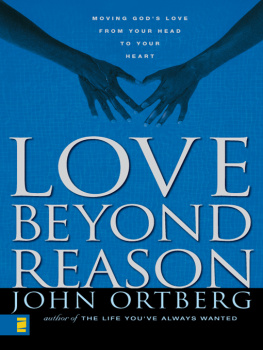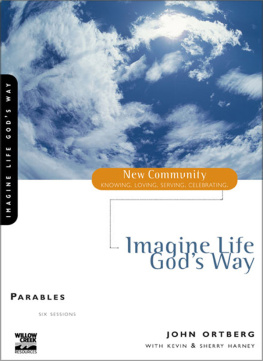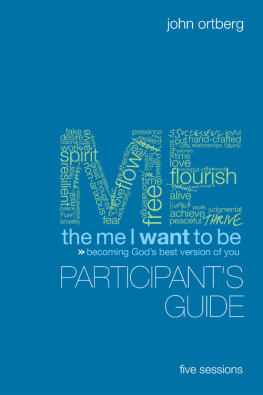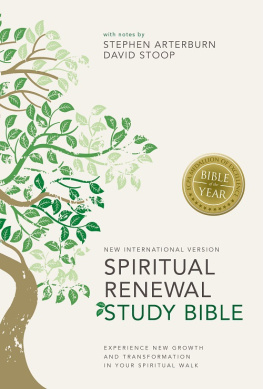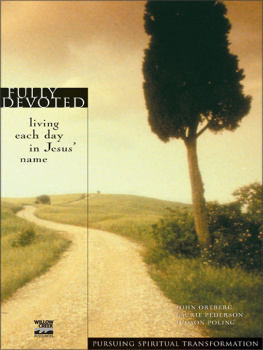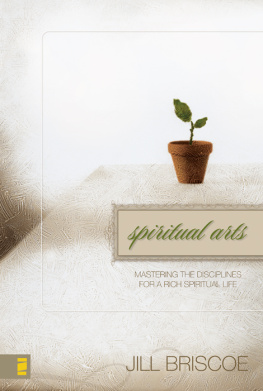If you have ever been frustrated with the state of your spiritual life. If youve ever wondered why spiritual growth seems to go so slowly. If youve ever wondered if real change is possible. If youve ever felt confused or stuck in your spiritual lifeyoure my kind of person.
I have struggled (and still do struggle) with those same things. But I have also discovered that it is possible to live the life Ive always wanted to live. You see, the Christian gospel insists that the transformation of the human personality really is possible. It is never easy. It is rarely quick. But it is possible. I see it happening in people sometimesoccasionally even in myself.
It happens any time people become intensely serious about learning from Jesus how to arrange their lives. It happens any time people set their focus on learning to live as Jesus would live if he were in their place.
Throughout the centuries, wise people have devoted themselves to following Jesus in this way. This series is an attempt to make some of that wisdom accessible to people who live in a world of freeways, corporate ladders, and X boxes. When you are through, my hope is that you will accept Christs invitation to live life his way because it truly is the life youve always wanted.
In this ebook edition, please use your devices note-taking function to record your thoughts wherever you see the bracketed instructions [Your Notes] or [Your Response]. Use your devices highlighting function to record your response whenever you are asked to checkmark, circle, underline, or otherwise indicate your answer(s).
SESSION ONE
Its Morphing Time
The good news as Jesus preached it is that now it is possible for ordinary men and women to live in the presence and under the power of God... It is not about the minimal entrance requirements for getting into heaven when you die. It is about the glorious redemption of human life your life. Its morphing time.
John Ortberg
Q UESTIONS T O T HINK A BOUT
1. To be transformed means to be changed, and transformation is taking place all around us all the time. What examples of transformationof any sortcome to mind?
[Your Response]
2. What is required for transformations such as those you have mentioned to occur?
[Your Response]
3. Although we use the term spiritual transformation, we often use it casually without giving it much thought. Describe what spiritual transformation means to you.
[Your Response]
4. What do you consider to be the indicators of spiritual transformation? How can we tell if another person has experienced a spiritual transformation?
[Your Response]
V IDEO O BSERVATIONS
Life: disappointment and hope
[Your Notes]
We shall morph indeed
[Your Notes]
Pseudo-transformation
[Your Notes]
Trying harder versus training wisely
[Your Notes]
V IDEO H IGHLIGHTS
1. What is the hope of the Christian gospel as John Ortberg describes it?
[Your Response]
2. An important concept in The Life Youve Always Wanted is that we are always being transformed; we are always changing for better or for worse. This happens physically and, although its less obvious, spiritually. How might some of our daily practices cause us to be formed spiritually in one direction or another?
[Your Response]
3. Why did Jesus so strongly challenge pseudo-transformation and the rabbis boundary markers regarding dietary laws, the Sabbath, and circumcision?
[Your Response]
4. In what ways does pseudo-transformation creep into churches today, and what are its damaging effects? Can you identify any boundary markers in your church?
[Your Response]
L ARGE G ROUP E XPLORATION
Pseudo-Transformation vs. Morphing
When our lives are not marked by genuine, God-directed spiritual change, we tend to look for substitute ways to distinguish ourselves from those we consider to be less spiritual. We adopt boundary markershighly visible, relatively superficial practices intended to quickly separate the insiders from the outsiders. These boundary markers may include conformity to specified forms of dress and speech, adherence to certain rules of behavior, participation in prescribed activities, and so on. They provide a false sense of security and superiority.
The religious leaders of Jesus day focused a great deal of their attention on boundary markers. Many of their conflicts with Jesus occurred because Jesus took a radically different approach to assessing spirituality. Instead of focusing on visible indicators of spiritual transformation, Jesus focused on what was happening in the heart. His concern was whether or not people were being transformed and growing in their love of God and love of people. His concern was whether or not they were morphing into the masterpieces God created them to be.
Lets consider these opposing perspectives on spiritual transformation.
1. Read Matthew 12:12; 15:12; Luke 18:1112. Note the types of spiritual behaviors the religious leaders of Jesus day considered important. What was Jesus assessment of their spirituality? (See Mark 7:58.)
[Your Response]
2. What did Jesus say that no doubt shocked the religious leaders? (Read Matthew 21:2832.)
[Your Response]
3. Instead of focusing on external religious practices, what did Jesus emphasize? (Read Luke 10:2528; John 13:3435.)
[Your Response]
4. What is the evidence of true spiritual transformation in our lives? (Read 1 Corinthians 13:17.)
[Your Response]
5. Now lets consider morphing. The word morph comes from the Greek word morphoo, which means the inward and real formation of the essential nature of a person. The term was used to describe the formation and growth of an embryo in a mothers body.
The kind of spiritual transformation God wants each of us to experience is a complete remaking of our nature. He wants us to see, feel, think, and do what Jesus would if he were in our unique place. What makes such a transformation possible, and why is it important? (See Romans 6:314; 2 Corinthians 5:1720; Ephesians 2:10.)
[Your Response]
6. Another form of the word morph is used in the phrase until Christ is formed in you in Galatians 4:19. This word, summorphizo, means to have the same form as another, to shape a thing into a durable likeness.
Our spiritual growth is to be a molding process, a process whereby we are shaped in the image of Christ. Notice what the following verses reveal about the process of spiritual growth God accomplishes within each Christian.
a. Galatians 4:19
[Your Response]
b. Colossians 3:5-10
[Your Response]
c. 2 Corinthians 3:18
[Your Response]
7. In Romans 12:2, Paul used the word metamorphoo, from which we get the English word metamorphosis


